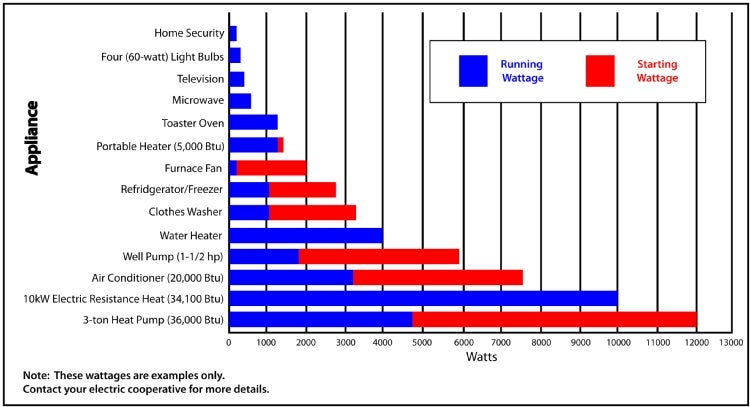You can use a portable generator to supply electricity to your appliances if an emergency exists during a power outage. But if used improperly, they can kill you and the people who are restoring power to your building. They also can damage the appliances you connect. Connecting a generator to the main electrical supply for your house requires the services of a qualified, licensed electrician.
Before connecting the generator to your household circuit, notify your electric cooperative. Always have a licensed electrician install your electric generator to ensure that it is installed properly
If you fail to ground the generator's electrical system adequately, the entire generator could become electrically charged and cause electrocution. Make sure that the unit is connected to an appropriate electrical ground, in accordance with the National Electrical Code. Follow the instructions supplied with the generator.
If the generator is using worn, damaged, undersized or ungrounded extension cords, many dangers can harm the generator and/or you. Contact with worn or damaged extension cords could cause electrocution. Undersize extension cords could overheat wires or attached items, resulting in fire. Use of ungrounded cord sets could prevent operation of circuit breakers and result in electrical shock.
Do not operate generator exposed to rain, wet, icy or flooded conditions. If the water comes into contact with the electricity produced by the generator, the frame could become energized.
Failure to ventilate generator by operating in an enclosed area causes overheating and possible ignition of the materials. It will produce toxic carbon monoxide exhaust fumes from the engine, which if breathed in will cause serious injury or death.
Do not attempt to fill the fuel tank while the engine is running! Gasoline and gasoline vapors can become ignited by coming in contact with hot components such as the muffler, engine exhaust gases or from an electrical spark.
Avoid tampering with factory set engine speed settings, the adjustment could result in overheating of attachments and could cause a fire
If you attempt to connect generator directly to the electrical system of any building, you can kill or injure a person repairing service lines! The electricity you generate will back feed through the building's electrical system to the outside utility feed lines.
Never exceed the rated capacity of your generator. Overloading can cause serious damage to the generator or appliances. Before operating a generator, list all of the appliances that are going to operate at the same time. Then determine the starting wattage requirements and the running wattage requirements. The starting load lasts only for a few seconds, but is very important when figuring your total wattage to be used. Your generator must be created to handle the total wattage. Ratings shown here are samples. Wattage requirements vary with different brands of appliances. Be sure to check the name plate on the appliances you plan to use. Always start your largest electric motor first, then plug in other items one at a time.

